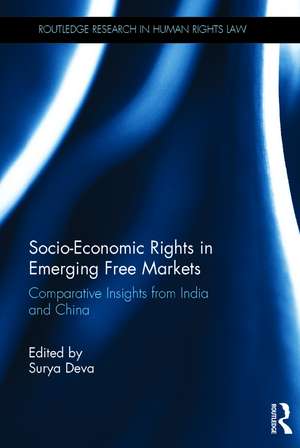Socio-Economic Rights in Emerging Free Markets: Comparative Insights from India and China: Routledge Research in Human Rights Law
Editat de Surya Devaen Limba Engleză Hardback – 15 oct 2015
This book investigates how the gradual adoption of free market ideology has impacted on the realisation of socio-economic rights in both India and China and how the constitutional and legal frameworks have made necessary adjustments. Chapters in this volume, which are written by academics of international standing, explore how these two countries have tried to overcome certain common governance challenges in realising socio-economic rights. The role played by courts in India and China in the protection and realisation of socio-economic rights is considered along with the use and limitations of public interest litigation in achieving these rights. Finally, the effectiveness of measures in realising socio-economic rights are evaluated in relation to specific rights such as the rights to food, health, education, social security, and gender equality.
| Toate formatele și edițiile | Preț | Express |
|---|---|---|
| Paperback (1) | 396.40 lei 6-8 săpt. | |
| Taylor & Francis – 14 aug 2020 | 396.40 lei 6-8 săpt. | |
| Hardback (1) | 1117.88 lei 6-8 săpt. | |
| Taylor & Francis – 15 oct 2015 | 1117.88 lei 6-8 săpt. |
Din seria Routledge Research in Human Rights Law
-
 Preț: 327.55 lei
Preț: 327.55 lei -
 Preț: 309.90 lei
Preț: 309.90 lei -
 Preț: 328.25 lei
Preț: 328.25 lei -
 Preț: 386.21 lei
Preț: 386.21 lei - 8%
 Preț: 388.56 lei
Preț: 388.56 lei -
 Preț: 312.02 lei
Preț: 312.02 lei - 20%
 Preț: 268.89 lei
Preț: 268.89 lei -
 Preț: 311.18 lei
Preț: 311.18 lei -
 Preț: 384.91 lei
Preț: 384.91 lei -
 Preț: 327.10 lei
Preț: 327.10 lei -
 Preț: 326.49 lei
Preț: 326.49 lei - 9%
 Preț: 936.56 lei
Preț: 936.56 lei -
 Preț: 318.31 lei
Preț: 318.31 lei -
 Preț: 341.55 lei
Preț: 341.55 lei - 18%
 Preț: 1167.58 lei
Preț: 1167.58 lei - 18%
 Preț: 1058.38 lei
Preț: 1058.38 lei - 18%
 Preț: 1058.65 lei
Preț: 1058.65 lei - 18%
 Preț: 1056.28 lei
Preț: 1056.28 lei - 26%
 Preț: 822.34 lei
Preț: 822.34 lei - 18%
 Preț: 1168.40 lei
Preț: 1168.40 lei - 25%
 Preț: 823.63 lei
Preț: 823.63 lei -
 Preț: 371.64 lei
Preț: 371.64 lei -
 Preț: 473.88 lei
Preț: 473.88 lei - 18%
 Preț: 1110.92 lei
Preț: 1110.92 lei - 26%
 Preț: 847.31 lei
Preț: 847.31 lei -
 Preț: 369.73 lei
Preț: 369.73 lei -
 Preț: 464.16 lei
Preț: 464.16 lei - 18%
 Preț: 1169.97 lei
Preț: 1169.97 lei - 25%
 Preț: 824.17 lei
Preț: 824.17 lei - 18%
 Preț: 1057.57 lei
Preț: 1057.57 lei - 18%
 Preț: 1061.06 lei
Preț: 1061.06 lei - 18%
 Preț: 1111.58 lei
Preț: 1111.58 lei - 18%
 Preț: 1057.75 lei
Preț: 1057.75 lei - 18%
 Preț: 1109.18 lei
Preț: 1109.18 lei - 18%
 Preț: 1061.57 lei
Preț: 1061.57 lei -
 Preț: 475.16 lei
Preț: 475.16 lei - 18%
 Preț: 1059.48 lei
Preț: 1059.48 lei - 18%
 Preț: 1060.52 lei
Preț: 1060.52 lei -
 Preț: 414.32 lei
Preț: 414.32 lei - 18%
 Preț: 1053.92 lei
Preț: 1053.92 lei -
 Preț: 423.30 lei
Preț: 423.30 lei
Preț: 1117.88 lei
Preț vechi: 1363.27 lei
-18% Nou
Puncte Express: 1677
Preț estimativ în valută:
213.90€ • 223.93$ • 176.99£
213.90€ • 223.93$ • 176.99£
Carte tipărită la comandă
Livrare economică 05-19 aprilie
Preluare comenzi: 021 569.72.76
Specificații
ISBN-13: 9780415735070
ISBN-10: 0415735076
Pagini: 390
Ilustrații: 6 black & white tables
Dimensiuni: 156 x 234 x 25 mm
Greutate: 0.7 kg
Ediția:1
Editura: Taylor & Francis
Colecția Routledge
Seria Routledge Research in Human Rights Law
Locul publicării:Oxford, United Kingdom
ISBN-10: 0415735076
Pagini: 390
Ilustrații: 6 black & white tables
Dimensiuni: 156 x 234 x 25 mm
Greutate: 0.7 kg
Ediția:1
Editura: Taylor & Francis
Colecția Routledge
Seria Routledge Research in Human Rights Law
Locul publicării:Oxford, United Kingdom
Public țintă
PostgraduateCuprins
Chapter 1. Socio-Economic Rights in India and China: Time for Academic Engagement between the Two Asian Giants (Surya Deva) Part I: Governance Challenges Chapter 2 Socio-Economic Rights in the Contemporary World Market: China, India, and the ‘Gang of Four’ (Paul Cammack) Chapter 3. Realising Socio-Economic Rights under Emerging Global Regulatory Frameworks: The Potential Impact of Privatisation and the Role of Companies in China and India (Larry Catá Backer) Chapter 4. The Right to Environment in Emerging Economies: An India-China Comparison (Domenico Amirante) Part II: Role of Courts and Public Interest Litigation Chapter 5 Enforcing Social Rights through Public Interest Litigation: An Overview of Indian Experience (Parmanand Singh) Chapter 6. A Tale of Two Judiciaries: Judicial Enforcement of Economic and Social Rights in China and India (Randall Peerenboom) Chapter 7. The Paradox of Justiciability: Labour Rights Litigation and the Realisation of Socio-Economic Rights in China and India (Leïla Choukroune) Chapter 8. Protection of Labour Rights through Judicial Legislation in China: An Analysis of its Constitutionality and Possible Solution (Lin Feng and Wang Shucheng) Chapter 9. Social Justice and Social Rights in Hong Kong: Recent Judicial Review Developments and Proposal for Legislative Change (Karen Kong) Part III: Selected Indo-Chinese Perspectives on Socio-Economic Rights Chapter 10. The Vindicated Market and Vulnerable Health Care: Human Rights Perspective from India (Uday Shankar) Chapter 11. Bilateral Investment Treaties and Public Health: Comparative Insights from China and India (Prabhash Ranjan) Chapter 12. Right to Food and Safety of Food: Reviewing the Approaches Adopted by China and India (Mo Jihong and Kavitha Ramanathan) Chapter 13. Right to Education in India and China (Mahendra P Singh and Liu Jianlong) Chapter 14. Right to Social Security: Assessing Chinese Practice against International Standards (Zhu Guobin) Chapter 15 ‘No Child Policy’ vs. ‘One-Child Policy’ in Emerging Free Markets: Has It Mattered for Women in India and China? (Surya Deva)
Descriere
This book investigates how the gradual adoption of free market ideology has impacted on the realisation of socio-economic rights in both India and China and how the constitutional and legal frameworks have made necessary adjustments. Chapters in this volume, which are written by academics of international standing, explore how these two countries have tried to overcome certain common governance challenges in realising socio-economic rights. The role played by courts in India and China in the protection and realisation of socio-economic rights is considered along with the use and limitations of public interest litigation in achieving these rights. Finally, the effectiveness of measures in realising socio-economic rights are evaluated in relation to specific rights such as the rights to food, health, education, social security, and gender equality.














